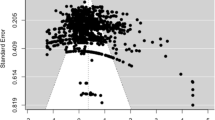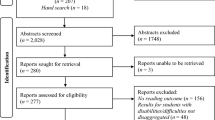Abstract
Students’ poor performance on national assessments of writing suggests that educators need effective approaches to assess and intervene with writing problems. Brief experimental analysis (BEA) has supporting evidence for identifying interventions in reading, but little research has investigated BEA with writing. Early writing is an especially important period for students, and the current study sought to extend BEA research in early writing. Results showed that BEAs for 3 first grade students identified promising writing interventions, and extended analyses showed improved performance for each student following implementation of the interventions. Implications for future research in direct assessment and intervention are discussed.





Similar content being viewed by others
References
Baer, D. M., Wolf, M. M., & Risley, T. R. (1968). Some current dimensions of applied behavior analysis. Journal of Applied Behavior Analysis, 1, 91–97.
Bangert-Drowns, R. L., Hurley, M. M., & Wilkinson, B. (2004). The effects of school-based writing-to-learn interventions on academic achievement: A meta-analysis. Review of Educational Research, 74, 29–58.
Bereiter, C., & Scardamalia, M. (1987). The psychology of written composition. Hillsdale, NJ: Lawrence Erlbaum Associates, Inc.
Berninger, V., & Amtmann, D. (2003). Preventing written expression disabilities through early and continuing assessment and intervention for handwriting and/or spelling problems: Research into practice. In H. L. Swanson, K. Harris, & S. Graham (Eds.), Handbook of learning disabilities (pp. 345–363). New York, Guilford.
Berninger, V. W., Vaughn, K. B., Abbott, R. D., Brooks, A., Abbott, S., Reed, E., et al. (1998). Early intervention for spelling problems: Teaching spelling unit of varying size within a multiple connections framework. Journal of Educational Psychology, 90, 587–605.
Bramlett, R. K., Murphy, J. J., Johnson, J., Wallingsford, L., & Hall, J. D. (2002). Contemporary practices in school psychology: A national survey of roles and referral problems. Psychology in the Schools, 39, 327–335.
Burns, M. K., Ganuza, Z., & London, R. (2009). Brief experimental analysis of written letter formation: Single-case demonstration. Journal of Behavioral Education, 18, 20–34.
Burns, M. K., VanDerHeyden, A. M., & Jiban, C. L. (2006). Assessing the instructional level for mathematics: A comparison of methods. School Psychology Review, 35, 401–418.
Burns, M. K., & Wagner, D. (2008). Determining an effective intervention within a brief experimental analysis for reading: A meta-analytic review. School Psychology Review, 37, 126–136.
Christ, T. J. (2006). Short-term estimates of growth using curriculum-based measurement of oral reading fluency: Estimates of standard error of the slope to construct confidence intervals. School Psychology Review, 35, 128–133.
Christ, T. J., & Ardoin, S. P. (2009). Curriculum-based measurement of oral reading: Passage equivalence and probe-set development. Journal of School Psychology, 47, 55–75.
Coker, D. L., & Ritchey, K. D. (2010). Curriculum based measurement of writing in kindergarten and first grade: An investigation of production and qualitative scores. Exceptional Children, 76, 175–193.
Cooper, D., & Pikulski, J. (1999). Invitations to literacy. Boston, MA: Houghton Mifflin.
Daly, E. J., I. I. I., Andersen, M., Gortmaker, V., & Turner, A. (2006). Using experimental analysis to identify reading fluency interventions: Connecting the dots. The Behavior Analyst Today, 7, 133–150.
Daly, E. J., I. I. I., Martens, B. K., Dool, E. J., & Hintze, J. M. (1998). Using brief functional analysis to select interventions for oral reading. Journal of Behavioral Education, 8, 203–218.
Daly, E. J., I. I. I., Martens, B. K., Hamler, K. R., Dool, E. J., & Eckert, T. L. (1999). A brief experimental analysis for identifying instructional components needed to improve oral reading fluency. Journal of Applied Behavior Analysis, 32, 83–94.
Daly, E. J., I. I. I., Witt, J. C., Martens, B. K., & Dool, E. J. (1997). A model for conducting a functional analysis of academic performance problems. School Psychology Review, 26, 554–574.
Deno, S. L. (1985). Curriculum-based measurement: The emerging alternative. Exceptional Children, 52, 219–232.
Deno, S. L., Mirkin, P., & Marston, D. (1980). Relationships among simple measures of written expression and performance on standardized achievement tests. (Report No. IRLD-RR-22). Minneapolis: University of Minnesota, Institute for Research on Learning Disabilities.
Duhon, G. J., Noell, G. H., Witt, J. C., Freeland, J. T., Dufrene, B. A., & Gilbertson, D. N. (2004). Identifying academic skill and performance deficits: The experimental analysis of brief assessments of academic skills. School Psychology Review, 33, 429–443.
Eckert, T. L., Ardoin, S. P., Daly, E. J., & Martens, B. K. (2002). Improving oral reading fluency: A brief experimental analysis of combining an antecedent intervention with consequences. Journal of Applied Behavior Analysis, 35, 271–281.
Fisher, W., Piazza, C. C., Bowman, L. G., Hagopian, L. P., Owens, J. F., & Slevin, I. (1992). A comparison of two approaches for identifying reinforcers for persons with severe and profound disabilities. Journal of Applied Behavior Analysis, 25, 491–499.
Fuchs, L. S. (2004). The past, present, and future of curriculum-based measurement research. School Psychology Review, 33, 188–192.
Fuchs, L. S., Deno, S. L., & Mirkin, P. K. (1984). The effects of frequent curriculum-based measurement and evaluation on pedagogy, student achievement, and student awareness of learning. American Educational Research Journal, 21, 449–460.
Fuchs, L. S., & Fuchs, D. (1999). Monitoring student progress toward the development of reading competence: A review of three forms of classroom-based assessment. School Psychology Review, 28, 659–671.
Fuchs, L. S., Fuchs, D., Hamlett, C. L., & Allinder, R. M. (1991a). Effects of expert system advice within curriculum-based measurement on teacher planning and student achievement in spelling. School Psychology Review, 20(1), 49–66.
Fuchs, L. S., Fuchs, D., Hamlett, C. L., & Stecker, P. M. (1991b). Effects of curriculum-based measurement and consultation on teacher planning and student achievement in mathematics operations. American Educational Research Journal, 28, 617–641.
Graham, S., & Harris, K. R. (2005). Improving the writing performance of young struggling writers: Theoretical and programmatic research from the Center on Accelerating Student Learning. Journal of Special Education, 39, 19–33.
Graham, S., Harris, K. R., & Fink, B. (2000). Is handwriting causally related to learning to write? Treatment of handwriting problems in beginning writers. Journal of Educational Psychology, 92, 620–633.
Graham, S., Harris, K. R., & Larsen, L. (2001). Prevention and intervention of writing difficulties for students with learning disabilities. Learning Disabilities Research & Practice, 16, 74–84.
Graham, S., & Perin, D. (2007). Writing next: Effective strategies to improve writing of adolescents in middle and high schools—a report to Carnegie Corporation of New York. Washington, DC: Alliance for Excellent Education.
Greenwald, E., Persky, H., Ambell, J., & Mazzeo, J. (1999). National assessment of Educational progress: 1998 report card for the nation and the states. Washington, DC: U.S. Department of Education.
Gresham, F. M., MacMillan, D. L., Beebe-Frankenberger, M. E., & Bocian, K. M. (2000). Treatment integrity in learning disabilities intervention research: Do we really know how treatments are implemented? Learning Disabilities Research & Practice, 15, 198–205.
Hammill, D. D., & Larsen, S. C. (1996). Test of written language (3rd ed.). Austin, TX: PRO-ED, Inc.
Harding, J., Wacker, D. P., Cooper, L. J., Millard, T., & Jensen-Kovalan, P. (1994). Brief hierarchical assessment of potential treatment components with children in an outpatient clinic. Journal of Applied Behavior Analysis, 27, 291–300.
Haring, N. G., & Eaton, M. D. (1978). Systematic instructional technology: An instructional hierarchy. In N. G. Haring, T. C. Lovitt, M. D. Eaton, & C. L. Hansen (Eds.), The fourth R: Research in the classroom. Columbus, OH: Merrill.
Herrick, V. E. (1960). Handwriting and children’s writing. Elementary English, 37, 248–258.
Johnston, J. M., & Pennypacker, H. S. (1993). Strategies and tactics of behavioral research (2nd ed.). Hillsdale, NJ: Erlbaum.
Jones, K. M., & Wickstrom, K. F. (2002). Done in sixty seconds: Further analysis of the brief assessment model for academic problems. School Psychology Review, 31, 554–568.
LaBerge, D., & Samuels, S. J. (1974). Toward a theory of automatic processing in reading. Cognitive Psychology, 6, 293–323.
Lembke, E., Deno, S., & Hall, K. (2003). Identifying an indicator of growth in early writing proficiency for elementary school students. Assessment for Effective Intervention, 28, 23–35.
Marston, D. (1989). A curriculum-based approach to assessing academic performance: What is it and why do it. In M. R. Shinn (Ed.), Curriculum-based measurement: Assessing special children (pp. 18–78). New York: Guilford.
McComas, J. J., Wacker, D. P., Cooper, L. J., Asmus, J. M., Richman, D., & Stoner, B. (1996). Brief experimental analysis of stimulus prompts for accurate responding on academic tasks in an outpatient clinic. Journal of Applied Behavior Analysis, 29, 397–401.
McLaughlin, T. F., & Skinner, C. H. (1996). Improving academic performance through self-management: Cover, copy, and compare. Intervention in School and Clinic, 32, 113–119.
McMaster, K. L., & Campbell, H. (2008). New and existing curriculum-based writing measures: Technical features within and across grades. School Psychology Review, 37, 550–556.
McMaster, K. L., Du, X., & Petursdottir, A. (2009). Technical features of curriculum-based measures for beginning writers. Journal of Learning Disabilities, 42, 41–60.
McMaster, K. L., Du, X., Yeo, S., Deno, S. L., Parker, D., & Ellis, T. (2011). Curriculum-based measures of beginning writing: Technical features of the slope. Exceptional Children, 77, 185–206.
McMaster, K., & Espin, C. (2007). Technical features of curriculum-based measurement in writing: A literature review. The Journal of Special Education, 41, 68–84.
National Commission on Writing. (2003). The neglected “R:” The need for a writing revolution. Retrieved 1 December 2009, from http://www.writingcommission.org/.
National Commission on Writing. (2004). Writing: A ticket to work… or a ticket out: A survey of business leaders. Retrieved 1 December 2009, from http://www.writingcommission.org/prod_downloads/writingcom/writing-ticket-to-work.pdf.
National Commission on Writing. (2005). Writing: A powerful message from state government. Retrieved 1 December 2009, from http://www.writingcommission.org/prod_downloads/writingcom/powerfulmessage-from-state.pdf.
Parker, D. C., McMaster, K. L., & Burns, M. K. (2011). Determining an instructional level for early writing skills. School Psychology Review, 40, 158–167.
Parker, R. I., Tindal, G., & Hasbrouck, J. (1991). Progress monitoring with objective measures of writing performance for students with mild disabilities. Exceptional Children, 58, 61–73.
Parker, R. I., & Vannest, K. J. (2009). An improved effect size for single case research: Non-overlap of all pairs (NAP). Behavior Therapy, 40, 357–367.
Persky, H. R., Daane, M. C., & Jin, Y. (2003). The nation’s report card: Writing 2002. (NCES 2003–529). Washington, DC: U.S. Department of Education, Institute of Education Sciences, National Center for Education Statistics.
Salahu-Din, D., Persky, H., & Miller, J. (2008). The Nation’s report card: Writing 2007. Retrieved 10 July 2008, from http://nces.ed.gov/nationsreportcard/writing/.
Samuels, S. J. (1979). The method of repeated reading. The Reading Teacher, 32, 403–408.
Shapiro, E. S. (2004). Academic skills problems: Direct assessment and intervention (3rd ed.). New York, NY: Guilford Press.
Skinner, C. H., McLaughlin, T. F., & Logan, P. (1997). Cover, copy, and compare: A self-managed academic intervention across skills, students, and settings. Journal of Behavioral Education, 7, 295–306.
Therrien, W. J. (2004). Fluency and comprehension gains as a result of repeated reading. Remedial and Special Education, 25, 252–261.
Treptow, M. A., Burns, M. K., & McComas, J. J. (2007). Reading at the frustration, instructional, and independent levels: The effects on student’s reading comprehension and time on task. School Psychology Review, 36, 159–166.
VanAuken, T., Chafouleas, S. M., Bradley, T. A., & Martens, B. K. (2002). Using brief experimental analysis to select oral reading interventions: An investigation of treatment utility. Journal of Behavioral Education, 11, 165–181.
Videen, J., Marston, D., & Deno, S. L. (1982). Correct word sequences: A valid indicator of proficiency in written expression (Vol. IRLD-RR-84). University of Minnesota, Institute for Research on Learning Disabilities.
Wilber, A., & Cushman, T. P. (2006). Selecting effective academic interventions: An example using brief experimental analysis for oral reading. Psychology in the Schools, 43, 79–84.
Author information
Authors and Affiliations
Corresponding author
Rights and permissions
About this article
Cite this article
Parker, D.C., Dickey, B.N., Burns, M.K. et al. An Application of Brief Experimental Analysis with Early Writing. J Behav Educ 21, 329–349 (2012). https://doi.org/10.1007/s10864-012-9151-3
Published:
Issue Date:
DOI: https://doi.org/10.1007/s10864-012-9151-3




